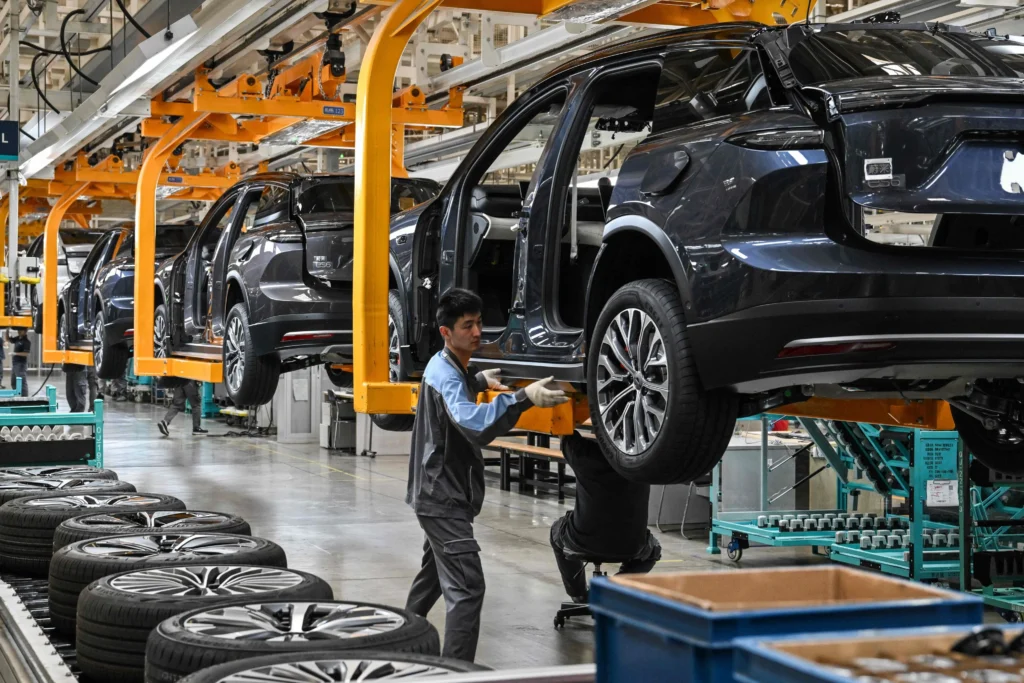Beijing, China – A contractor associated with BYD, the renowned Chinese electric vehicle (EV) manufacturer, has firmly dismissed allegations of subjecting workers to “slave-like conditions” in a factory construction project in Brazil. This denial follows revelations from local authorities in Bahia, a northeastern state of Brazil, regarding evidence of forced labor practices.
The controversy centers around Jinjiang Construction Brazil Ltd., a company contracted to build BYD’s factory in Camacari. Officials discovered over 160 Chinese workers reportedly enduring “degrading” conditions, some of whom exhibited visible signs of skin damage, raising alarms about potential violations of labor rights.
Jinjiang Construction Defends Its Position
Jinjiang Construction Brazil Ltd., in a statement released on Thursday, vehemently rejected the accusations, labeling them as baseless and injurious. The company argued that the claims have caused substantial harm to the dignity of Chinese nationals employed on the site.

“Being inexplicably labeled as ‘enslaved’ has left our staff deeply offended and violated their fundamental human rights,” the contractor stated via Weibo, China’s prominent social media platform.
To reinforce its position, the company disseminated images of a letter, allegedly endorsed by local Chinese workers, which refuted the allegations of substandard working conditions. It also attributed the misunderstandings to issues in translation, suggesting a potential cultural and linguistic disconnect.
Immediate Action by BYD
In response to the escalating controversy, BYD’s Brazilian subsidiary announced on Monday that it had terminated its agreement with the implicated branch of Jinjiang Construction. This decisive action was taken “with immediate effect”, reflecting BYD’s commitment to distancing itself from practices that contradict its corporate values.

Further, the local public ministry for works (MPT) in Bahia ordered a partial suspension of construction activities at the site. Authorities are conducting thorough investigations to ascertain the extent of labor violations.
A Troubling Discovery
The situation first came to light in November, when Bahia’s state ministry and collaborating authorities began systematic inspections of the factory site. According to a detailed statement from the MPT, these inspections uncovered disturbing evidence of “slave-like conditions” affecting 163 workers contracted by Jinjiang Construction.
The MPT’s findings painted a grim picture of “alarming precariousness” in the workers’ accommodations. Among the documented issues were:
- Workers sleeping on bed frames without mattresses, exposing them to physical discomfort and health risks.
- The absence of wardrobes or adequate storage for personal belongings, leading to their items being mixed with food supplies, an unsanitary and degrading arrangement.
These findings have drawn sharp criticism from human rights organizations and labor advocates, amplifying calls for accountability and reform.
Wider Implications for BYD and Jinjiang
The allegations against Jinjiang Construction have cast a shadow over BYD’s reputation as a leading player in the global EV market. Having recently surpassed Tesla to become the world’s largest EV manufacturer, BYD now faces heightened scrutiny regarding its supply chain ethics.

While the company’s swift termination of its contract with Jinjiang demonstrates a proactive stance, the incident raises broader questions about corporate oversight. How did such conditions persist undetected, and what measures will BYD implement to prevent similar incidents in the future?
A Global Debate on Labor Rights
This episode also reignites discussions about the globalization of labor and the ethical responsibilities of multinational corporations. Critics argue that outsourcing construction projects to contractors with insufficient safeguards against labor exploitation poses inherent risks.
“Companies must go beyond mere compliance with local laws and actively champion the protection of workers’ rights in every jurisdiction where they operate,” noted a labor rights advocate.
Potential Repercussions
The ongoing investigations could result in legal consequences for Jinjiang Construction, including financial penalties or restrictions on its operations in Brazil. Additionally, the case underscores the urgency for countries like Brazil to strengthen enforcement mechanisms to combat labor exploitation, particularly in projects involving foreign contractors.

BYD, meanwhile, must navigate the aftermath carefully to safeguard its brand integrity. Public perception of its commitment to sustainability and social responsibility may hinge on how transparently it addresses these allegations and institutes preventive measures.
Key Allegations and Actions
| Aspect | Details |
|---|---|
| Nature of Allegations | Forced labor and degrading working conditions |
| Affected Parties | 163 Chinese workers contracted by Jinjiang Construction |
| Conditions Reported | Lack of mattresses, improper storage of personal items with food supplies |
| BYD’s Response | Immediate termination of Jinjiang’s contract |
| Authorities Involved | Bahia state ministry, MPT |
| Outcome (Ongoing) | Investigations and partial suspension of construction work |
The allegations against Jinjiang Construction in Brazil represent a critical moment for both the contractor and BYD. While Jinjiang vehemently denies the claims, the evidence presented by local authorities paints a distressing picture that cannot be ignored. This case serves as a stark reminder of the importance of maintaining high ethical standards in global operations.
For BYD, this incident underscores the need for rigorous due diligence in selecting and monitoring contractors. As the company continues to expand its global footprint, its response to this controversy will likely define its reputation for years to come.
“A company’s true strength lies not only in its products but also in its principles,” an industry expert remarked. BYD’s handling of this matter will undoubtedly be watched closely by stakeholders, investors, and consumers alike.



